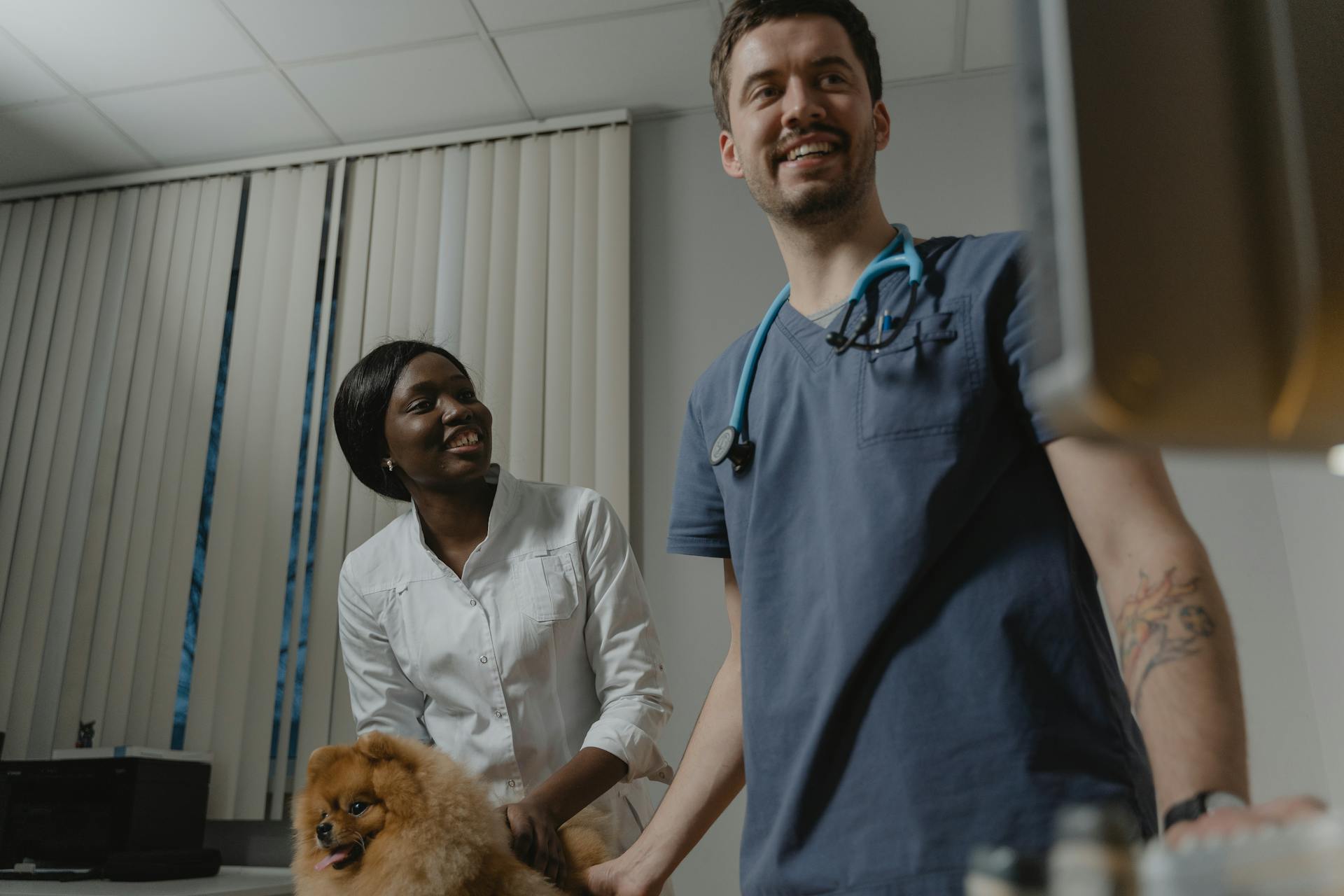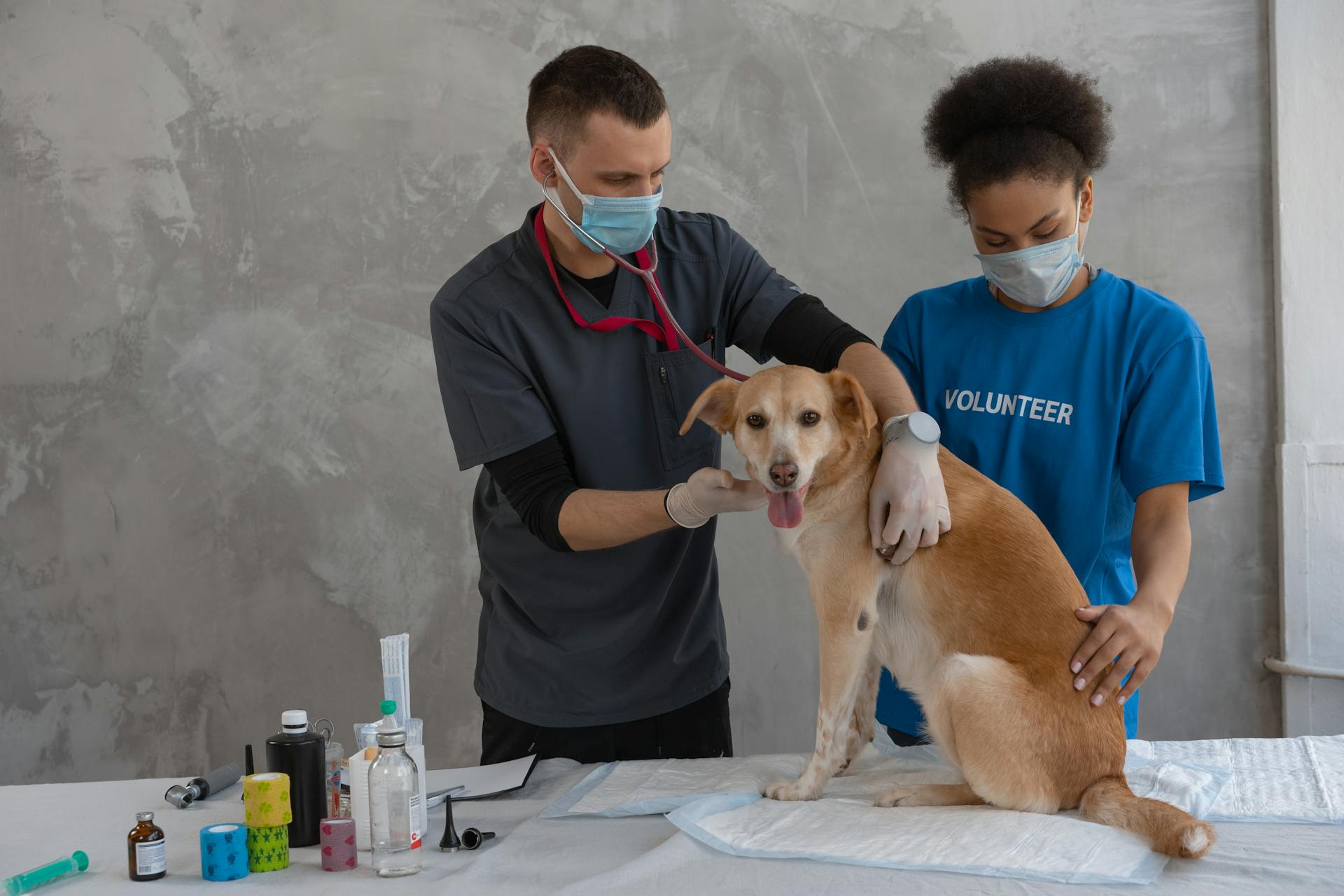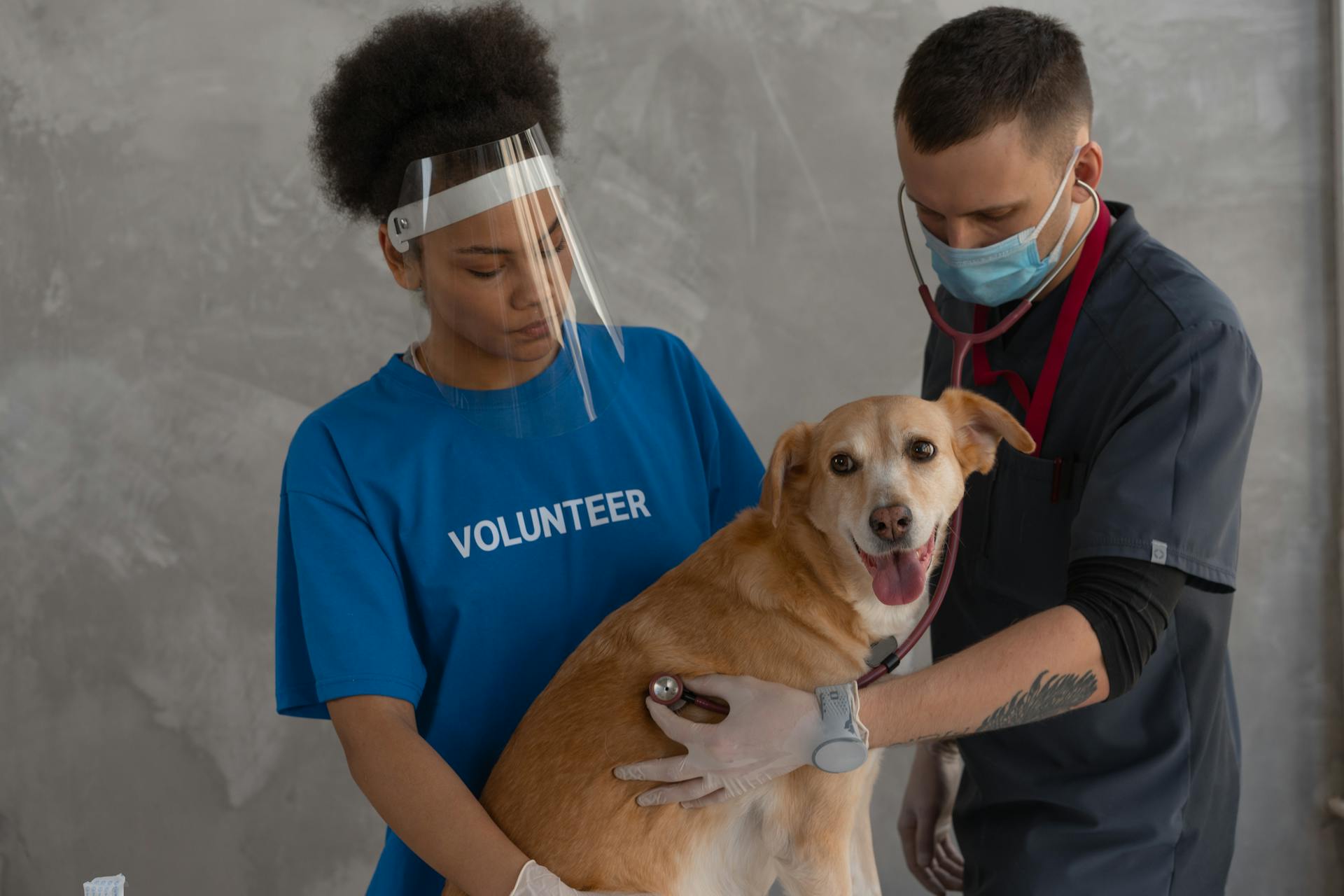
Dogs can get sick from eating certain foods, and it's often a sign that their diet needs a change.
Common symptoms of food-related illness in dogs include vomiting, diarrhea, and lethargy.
Some dogs may experience skin issues, such as itching and redness, due to food sensitivities.
Food allergies can cause a range of symptoms, including ear infections and digestive problems.
The most common causes of food-related illness in dogs are food allergies and sensitivities, which can be triggered by ingredients like beef, dairy, and wheat.
It's estimated that up to 30% of dogs suffer from food allergies or sensitivities.
Changing your dog's food can be a simple solution to resolving these issues.
Expand your knowledge: Can Dogs Develop Food Allergies
What is Causing the Problem?
If your dog is experiencing diarrhea, it's essential to consider the potential causes. Many times, it's not just an illness that's to blame, but also something as simple as what they've eaten.
Eating something they shouldn't have can cause stomach upset and diarrhea. This can happen when your dog gets into garbage or other non-food items.
You might like: What Food Is Best for Dogs with Diarrhea
Changing your dog's food too quickly can also lead to digestive issues. Their digestive tract needs time to adjust to the new food.
A food allergy or intolerance can cause gastrointestinal upset and diarrhea. This is a common issue that can be easily identified with the help of a veterinarian.
Symptoms and Diagnosis
If your dog is suffering from diarrhea caused by their food, you'll likely notice frequent bowel movements that are loose or watery. Diarrhea can quickly become a concern because your dog can become dehydrated.
Other symptoms to watch for include anxiously needing to go outside quickly, having bowel movements in the house, straining, stomach ache, fever, lethargy, loss of appetite, and dehydration. These symptoms can be a sign that your dog's diet is not agreeing with them.
If you suspect your dog has diarrhea, it's essential to call your veterinarian for an appointment. They will need to collect a stool sample to perform a fecal exam and rule out internal parasites as the cause of the diarrhea.
A unique perspective: Too Many Dog Treats Cause Diarrhea
Symptoms

If your dog is suffering from diarrhea, you'll likely notice frequent bowel movements that are loose or watery.
They may anxiously need to go outside quickly.
Straining during bowel movements is another common symptom.
A stomach ache can also be a sign of diarrhea in dogs.
Fever is another possible symptom to watch out for.
Lethargy can be a sign that your dog is not feeling well.
Loss of appetite is another symptom to be aware of.
Dehydration is a serious concern that can arise from diarrhea, so it's essential to keep an eye out for it.
Here are some common symptoms of diarrhea in dogs:
- Anxiously needing to go outside quickly
- Having bowel movements in the house
- Straining
- Stomach ache
- Fever
- Lethargy
- Loss of appetite
- Dehydration
Diagnosis
A stool sample will be collected from your dog to be used in a fecal exam to look for internal parasites that can cause diarrhea.
Your veterinarian will need a detailed list of what your dog eats or might have eaten, as well as their medical history.
A urinalysis, complete blood count, and biochemistry panel may be recommended to rule out other illnesses or conditions.

Your veterinarian will conduct a hands-on physical examination, including palpating your dog's abdomen, checking their vitals, and taking their temperature.
They will ask about how quickly the signs came on and if there were any changes in the environment.
Once all the tests have come back and the physical examination is completed, your veterinarian will be able to narrow the cause of your dog's diarrhea to their diet.
Consider reading: How to Make a Dog's Coat Shiny?
Causes and Treatment
Causes of diarrhea in dogs can be attributed to their diet, often resulting from eating something they shouldn't have, such as garbage or too much of their regular food.
Changing your dog's food too quickly can also cause stomach upset and diarrhea, making it essential to introduce new food slowly to allow their digestive tract to adjust.
Allowing your dog to eat garbage can lead to diarrhea, so it's crucial to keep an eye on them and prevent this from happening.
A food allergy or intolerance can cause gastrointestinal upset and diarrhea, requiring a permanent change to their diet to avoid the problematic ingredient.
Treatment for diarrhea due to diet in dogs may involve fluid therapy to prevent dehydration, which can require a stay in the animal hospital until the diarrhea subsides.
Recommended read: Food Diet for Dogs
Causes in Dogs
Diarrhea in dogs can be caused by eating something they shouldn't have, leading to stomach upset and diarrhea.
Changing a dog's food too quickly can cause digestive issues and diarrhea.
Eating too much or garbage can also lead to diarrhea.
A food allergy or intolerance can cause gastrointestinal upset and diarrhea.
Your dog may get into something they shouldn't have eaten and that can cause diarrhea.
Expand your knowledge: Dogs Eating Garlic
Treatment
Treatment is crucial to help your dog recover from diarrhea. Fluid therapy may be required to prevent dehydration, and your dog may need to stay in the animal hospital until the diarrhea is stopped.

Anti-diarrhea medication may also be prescribed by your veterinarian. Food may need to be withheld for at least 24 hours to allow your dog's digestive system to rest.
Small amounts of water will need to be given frequently to keep your dog hydrated. If your dog is not already dehydrated, this is essential to prevent dehydration from occurring.
A bland diet can be given after 24 hours, and if there is no more diarrhea, your dog can slowly be changed back to their regular diet. If your dog has an allergy or intolerance to an ingredient in their food, their diet will need to be permanently altered.
Frequently Asked Questions
What dog food is making dogs sick in 2024?
Pedigree Adult Complete Nutrition Grilled Steak & Vegetable Flavor Dry Dog Food is the affected product. A limited voluntary recall was issued in May 2024 due to potential loose metal pieces in some bags.
Sources
- https://www.newsweek.com/dog-food-recall-warning-issued-pet-owners-16-states-1857661
- https://www.dogfoodadvisor.com/dog-food-recalls/
- https://wagwalking.com/condition/diarrhea-due-to-diet
- https://www.wtsp.com/article/news/verify/purina-dog-food-safety-claims-viral-social-media-allegations/67-2cb27d65-7800-4ba2-9290-dbb0912eaa5a
- https://bestlifeonline.com/purina-making-dogs-cats-sick-news/
Featured Images: pexels.com


